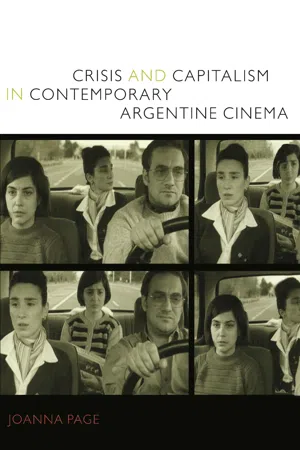
- English
- PDF
- Available on iOS & Android
Crisis and Capitalism in Contemporary Argentine Cinema
About This Book
There has been a significant surge in recent Argentine cinema, with an explosion in the number of films made in the country since the mid-1990s. Many of these productions have been highly acclaimed by critics in Argentina and elsewhere. What makes this boom all the more extraordinary is its coinciding with a period of severe economic crisis and civil unrest in the nation. Offering the first in-depth English-language study of Argentine fiction films of the late twentieth century and early twenty-first, Joanna Page explains how these productions have registered Argentina's experience of capitalism, neoliberalism, and economic crisis. In different ways, the films selected for discussion testify to the social consequences of growing unemployment, rising crime, marginalization, and the expansion of the informal economy.
Page focuses particularly on films associated with New Argentine Cinema, but she also discusses highly experimental films and genre movies that borrow from the conventions of crime thrillers, Westerns, and film noir. She analyzes films that have received wide international recognition alongside others that have rarely been shown outside Argentina. What unites all the films she examines is their attention to shifts in subjectivity provoked by political or economic conditions and events. Page emphasizes the paradoxes arising from the circulation of Argentine films within the same global economy they so often critique, and she argues that while Argentine cinema has been intent on narrating the collapse of the nation-state, it has also contributed to the nation's reconstruction. She brings the films into dialogue with a broader range of issues in contemporary film criticism, including the role of national and transnational film studies, theories of subjectivity and spectatorship, and the relationship between private and public spheres.
Frequently asked questions
Information
Table of contents
- Contents
- Acknowledgments
- Introduction
- 1. Nation, State, and Filmmaking in Contemporary Argentina
- 2. New Argentine Cinema and the Production of Social Knowledge
- 3. Labor, Bodies, and Circulation
- 4. Crime and Capitalism in Genre Cinema
- 5. Nation, Migration, and Globalization
- 6. Memory and Subjectivity
- 7. The Politics of Private Space
- Conclusion
- Notes
- Bibliography
- Index